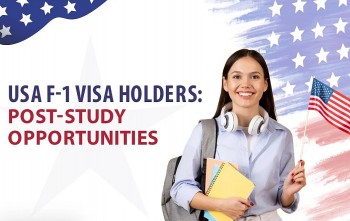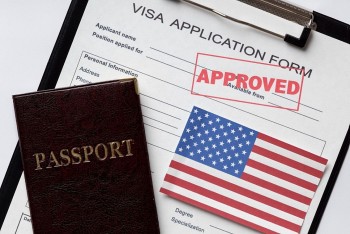What Is the F-1 Visa That the U.S. Has Revoked for International Students?
 List of Countries Offering Golden Visas for Whole Families in 2025 List of Countries Offering Golden Visas for Whole Families in 2025 |
 What Are Changes Coming For U.S. Visa Holders? What Are Changes Coming For U.S. Visa Holders? |
In a sweeping and controversial move, the U.S. Department of State has revoked the F-1 student visas of more than 300 international students, citing national security concerns tied to alleged campus activism and online engagement with what officials have labeled “anti-national content.”
The crackdown, ordered under the Trump administration, has sparked widespread debate over immigration policy, freedom of speech, and the use of artificial intelligence in visa enforcement. As international students across the country receive unexpected revocation notices, many are now left scrambling for answers—and a way forward.
Read more: What Are the New U.S. Visa Interview Rules in 2025? Don’t Miss These Visa Changes
 |
| What is an F1 student visa |
What Is an F-1 Visa?
The F-1 visa is a nonimmigrant visa that allows international students to study full-time at accredited academic institutions in the United States. It covers a wide range of educational institutions, including:
-
Colleges and universities
-
Seminaries and conservatories
-
High schools and elementary schools
-
Language training programs
To qualify, applicants must be accepted into a Student and Exchange Visitor Program (SEVP)-certified school and demonstrate financial stability, academic readiness, and intent to return home after completing their program. Students must also maintain full-time enrollment and follow specific regulations to retain legal status.
The F-1 visa is one of the most commonly issued visas to international students and is seen globally as a gateway to prestigious American education and opportunities for post-graduation training and research.
Why Were F-1 Visas Revoked?
The U.S. government, under the direction of Secretary of State Marco Rubio, initiated what is being called the “Catch and Revoke” program—a security-focused initiative that uses artificial intelligence to monitor international students’ online activity, particularly on social media platforms.
According to government sources, more than 300 students have already had their visas revoked for suspected involvement in "campus activism" and for sharing or engaging with content viewed as “supportive of terrorist groups” or “anti-national.”
Students affected received emails from the State Department notifying them that their F-1 visas were canceled. The email instructed them to self-deport using the CBP (Customs and Border Protection) One mobile app.
In a press conference, Rubio defended the policy, saying, “Every country has the right to decide who comes in as a visitor and who doesn’t. Maybe it’s more than 300 at this point. We do it every day. Every time I find one of these lunatics, I take away their visa.”
How Are Students Being Monitored?
Under the new enforcement approach, AI tools are used to scan digital footprints, including social media accounts, public online behavior, and shared content. The Department of Homeland Security has confirmed that this scrutiny now extends not only to F visas but also to M (vocational) and J (exchange) visa categories.
Key areas being flagged include:
-
Public support for groups designated as terrorist organizations by the U.S.
-
Participation in political rallies, especially those connected to foreign conflicts (e.g., Gaza, Iran)
-
Sharing or amplifying boycott movements such as BDS (Boycott, Divestment, Sanctions)
Though no evidence has been released showing direct links to terrorism, critics argue that the policy is sweeping in nature and risks violating international students' rights to free expression and due process.
High-Profile Cases
Several students have already drawn media attention due to the sudden and opaque nature of the visa revocations:
-
Rümeysa Öztürk, a Turkish Fulbright scholar at Tufts University, was reportedly detained after co-authoring an op-ed supporting the BDS movement. Though her work was within legal bounds of free speech, her visa was still revoked under the new policy.
-
Alireza Doroudi, an Iranian Ph.D. candidate at the University of Alabama, was taken into ICE custody despite being in good academic standing and receiving prior approval from the university’s international office.
Both cases raise concerns over inconsistent enforcement and whether universities can effectively shield students from federal action once a visa is revoked.
What Are the Consequences?
For students who lose their F-1 visa status, the consequences are immediate and severe:
-
Loss of Legal Status: Without a valid visa, students are expected to leave the country immediately. Staying could lead to detention or deportation.
-
Academic Disruption: Many students are forced to abandon degrees, research, or thesis work mid-program.
-
Long-Term Impact: A visa revocation can make reapplying for future U.S. visas difficult, if not impossible.
Some students are seeking asylum, while others are trying to transfer to universities in Canada, the UK, or Australia to continue their studies.
What Should Current and Prospective Students Do?
If you're an international student in the U.S., here’s how to protect yourself:
1. Review Your Online Activity
Avoid posting or sharing anything that could be misinterpreted as support for violence or anti-U.S. organizations. Even if your intent is academic or humanitarian, government algorithms may not interpret nuance.
2. Stay in Contact with International Student Advisors
Universities have dedicated staff to help international students stay in compliance with U.S. regulations. If you receive any notice or warning, notify them immediately.
3. Use Legal Counsel
If your visa is revoked, don’t wait. Immigration lawyers can help file for review, appeal, or even help pursue asylum claims in some cases.
4. Keep Documents Ready
Have a valid passport, I-20 form, and any recent travel or communication records organized. You may be asked to verify your status quickly.
5. Monitor Policy Updates
Visa rules can change rapidly. Reliable sources include:
-
Your university’s international office
A Broader MessageThis unprecedented visa revocation wave sends a strong message: U.S. immigration and student visa policies are becoming more security-driven and politically influenced. For students hoping to study in the U.S., academic excellence is no longer the only criterion—your public presence, opinions, and affiliations now matter more than ever. While the government maintains that national security is the top priority, advocacy groups and civil rights organizations are warning that this may be a step toward censorship and profiling. |
Final Thoughts
The F-1 visa has long been a symbol of educational opportunity, drawing some of the world’s brightest minds to American campuses. But with rising surveillance and political pressures, its future as a straightforward academic pathway is increasingly uncertain.
As the U.S. government expands its scrutiny, international students must be more vigilant, not only in academics but also in how they present themselves online. With visa revocations continuing, the landscape of student immigration in the U.S. is shifting—quickly and dramatically.
 Trump’s New Travel Ban: Full List of 43 Restricted Countries and What It Means for You Trump’s New Travel Ban: Full List of 43 Restricted Countries and What It Means for You U.S. President Donald Trump is planning a sweeping travel ban affecting citizens from 43 countries. The restrictions, categorized into three tiers, could bar millions from ... |
 Visa-Free Travel to the U.S. in 2025: Complete List of 43 Eligible Countries Visa-Free Travel to the U.S. in 2025: Complete List of 43 Eligible Countries The U.S. Department of State has released the 2025 update for the Visa Waiver Program (VWP), featuring an updated list of qualifying countries and revised ... |
 Is the $5 Million Gold Card Worth It? Unpacking America's Most Expensive Visa Program Is the $5 Million Gold Card Worth It? Unpacking America's Most Expensive Visa Program President Donald Trump announced a new immigration initiative called the "Gold Card," aimed at attracting ultra-wealthy foreigners by offering permanent U.S. residency in exchange for ... |
























